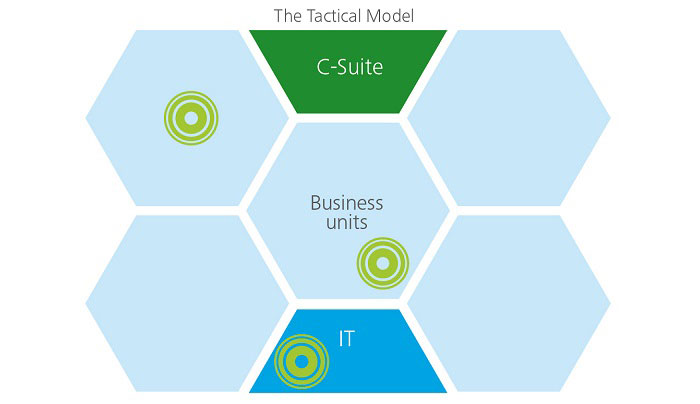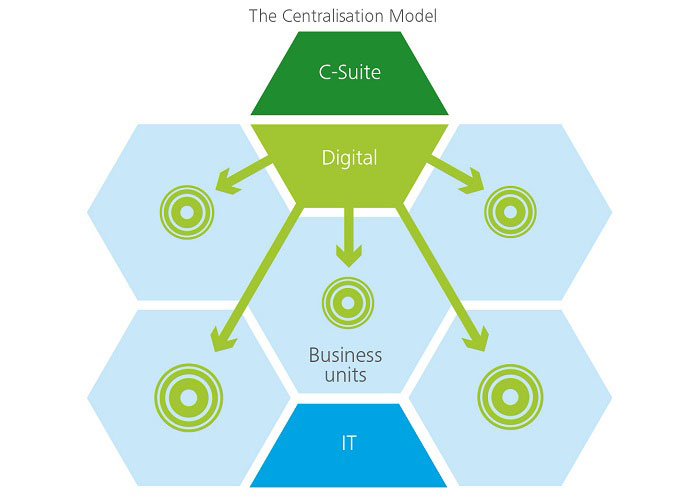The digital age is moving at such a pace that it is fundamentally transforming the way that organisations operate. With digital here to stay, companies which do not embrace the opportunity, risk joining the growing list of old-economy organisations that have fallen by the wayside.
Yet there is no single way to prepare for success in the digital age. Instead, businesses need to consider how they will adapt their structure, talent and leadership strategies, in order to compete.
Are organisations embracing 21st century technology with 20th century structures?
Organisations that thrive in the digital economy adopt loose hierarchies in which responsibility sits closer to where decisions have effect. Culturally open, dynamic and flexible structures built on mutual trust are the basis of the information economy and should be the long-term aspirations for many. They are focused on outcomes, not on the processes that realise those outcomes.
In our experience, there are four types of digital organisations:
- The Tactical Model – When digital technology and ways of working are used within business units to achieve existing targets, but with investments often made in silos.

- The Centralisation Model – Where digital initiatives and skills are consolidated in a central unit, pollinating digital applications between business units.

- The Champion Model – When a digital strategy is in place and has been effectively communicated across the business, not just to a central team.

- The Business As Usual Model – In which digital culture and processes are fully embedded in daily working life.

For many companies the Business As Usual Model will be a distant goal, but steps can be taken to move in this direction. Even if organisations are not ‘digitally native’, successful leaders must pro-actively consider what they can learn from such models and attempt to understand how they can apply new ideas in what is still largely a world dominated by traditional, hierarchical structures.
Are companies equipped to attract, develop and retain digital talent?
As organisations focus on driving digital change, it is essential that they do not forget their people. Yet the best digital talent, at all levels, is in short supply and high demand. This proves a significant challenge for many companies, but not doing anything about the issue hinders the success of many perfectly formed digital strategies.
A key part of this planning process is to establish a talent strategy that is aligned to the organisation’s digital strategy. This planning process should highlight where talent is needed, and drive companies to be proactive in targeting the types of skills they desire. Understanding the expertise and requirements of the chosen talent group, having an active online presence and thinking outside of the traditional educational background of candidates, are all points to consider.
Furthermore, companies should not forget that whilst the acquisition of digital skills will be important, making the most of current employees is also crucial. Helping your staff develop new and existing digital skills and experience is vital to both short-term and long-term success, as well as staff retention in a competitive marketplace.
Some organisations are responding to the talent shortage in innovative ways. In our recent paper – Building your digital DNA: Lessons from digital leaders – one respondent explained how they launched an innovation lab to help respond to the global talent crunch in areas such as analytics, in order to allow their employees the opportunity to “grow skills, provide experience, and uncover new ideas globally.”
Does management know how to lead in a digital era?
Leadership is arguably more important in times of change, but the nature of leadership has itself changed to take into account the more collaborative nature of the digital workplace.
The digital age demands some form of digital knowledge and skills from leaders. Whilst traditional leadership expertise such as creating and communicating a clear vision remain critical, others skills such as the ability to manage people in a more relatable and flexible way are becoming increasingly necessary.
A digital leader must focus on setting a vision for the future by articulating and demonstrating the strategy to the wider business, clarify team roles and focus on being an advisor, not a dictator. The successful digital leader keeps their teams focused on outcomes, supports and reinforces their people, and is a role model to the organisation.
Leadership at all levels is also important, as digital impacts the entire organisation and requires effective management in each team or project to succeed. As another respondent in our recent leadership paper explained, “for digital to be adopted and used to its potential, it is particularly important for everyone from the top down to be committed to a digital culture.”
Digital is becoming ever more important to the current and future success of businesses, and those who embrace it have the potential to become the victors of the digital age.






